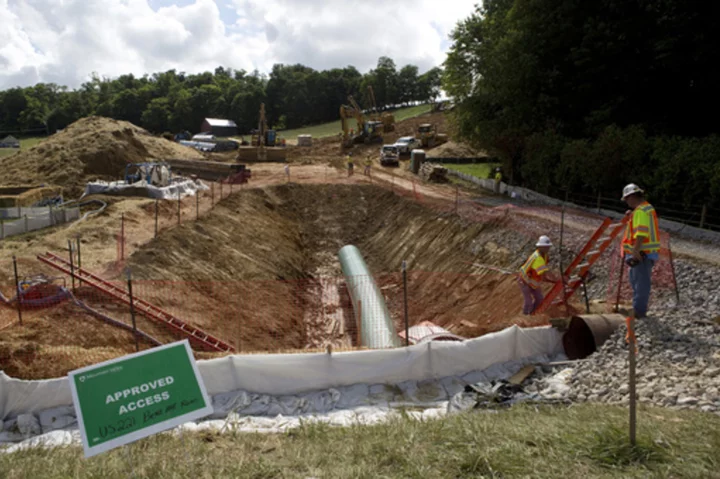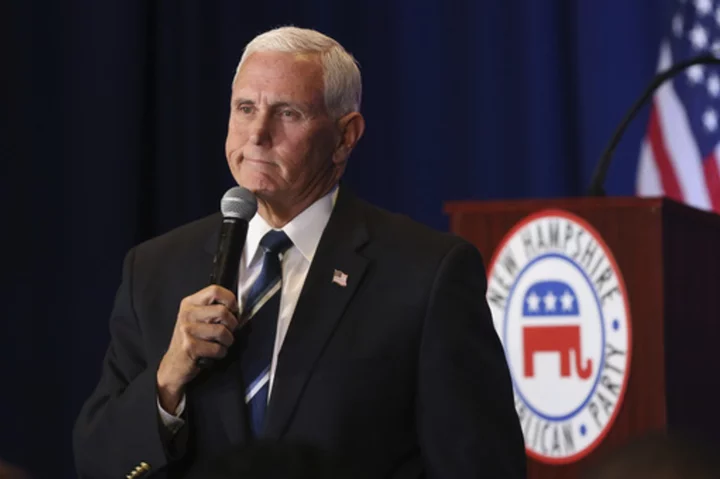FALLS CHURCH, Va. (AP) — A federal appeals court has again blocked construction on a contentious natural gas pipeline being built through Virginia and West Virginia, this time doing so even after Congress ordered the project's approval.
The stay issued Monday by the 4th Circuit Court of Appeals in Richmond comes after Congress passed legislation last month requiring all necessary permits be issued for construction of the Mountain Valley Pipeline. The law also stripped the 4th Circuit from jurisdiction over the case.
Environmentalists, though, argued that Congress overstepped its authority by enacting the law, saying it violates the separation of powers outlined in the Constitution.
“Congress cannot pick winners and losers in pending litigation by compelling findings or results without supplying new substantive law for the courts to apply,” lawyers for the environmentalists wrote in court papers.
Equitrans Midstream, one of the companies building the pipeline, issued a statement Tuesday saying it is considering an emergency appeal to the U.S. Supreme Court. It said the ruling jeopardizes its plan to complete the pipeline by the end of the year.
"The court’s decision defies the will and clear intent of a bipartisan Congress ... to expedite completion of the Mountain Valley Pipeline project, which was deemed to be in the national interest, the company said.
The law greenlighting the pipeline was passed last month as part of a bipartisan bill to raise the debt ceiling. The provision that deals exclusively with the Mountain Valley Pipeline was included after negotiators failed to reach an agreement on broader regulatory reform.
The White House supported putting the provision in the debt ceiling bill — over the objections of environmentalists and some Democrats — as a concession to Sen. Joe Manchin, a West Virginia Democrat and pipeline supporter who was a key vote for last year’s sweeping legislation that included deep investments in climate programs.
The stay issued Monday focuses on a 3-mile (5-kilometer) section of that cuts through the Jefferson National Forest. Environmentalists say the construction plan will cause erosion that will ruin soil and water quality. On Tuesday, the court issued a similar stay in connection with parallel litigation alleging the pipeline would violate the Endangered Species Act. Environmentalists made similar constitutional arguments in that case.
“Congress cannot mandate that federal regulators throw caution to the wind — environmental laws are more than just mere suggestions, and must be adhered to,” Sierra Club Executive Director Ben Jealous said in a statement.
The Fourth Circuit has blocked construction of the pipeline on multiple occasions over the years.
In court papers, lawyers for the pipeline say Congress is within its rights to strip the court from jurisdiction over the case. They also say that any debate over the law's constitutionality should be heard not by the 4th Circuit but by an appellate court in Washington, because the law passed by Congress last month spells out that precise scenario.
“Granting a stay of any kind would fly in the face of this recent, on-point, and emphatic Congressional command that the remaining construction of the Mountain Valley Pipeline must proceed without further delay,” the project's lawyers wrote in court briefs.
Mountain Valley Pipeline says the project is already substantially complete and that only three acres (one hectare) of trees need to be cleared, compared to more than 4,400 acres (1,700 hectares) already cleared.
The $6.6 billion, 300-mile (500-kilometer) pipeline is designed to meet growing energy demands in the South and Mid-Atlantic by transporting gas from the Marcellus and Utica fields in Pennsylvania and Ohio.
The stay includes no explanation of the court's rationale. It remains in place only until the court issues a full ruling on the merits of the case.









